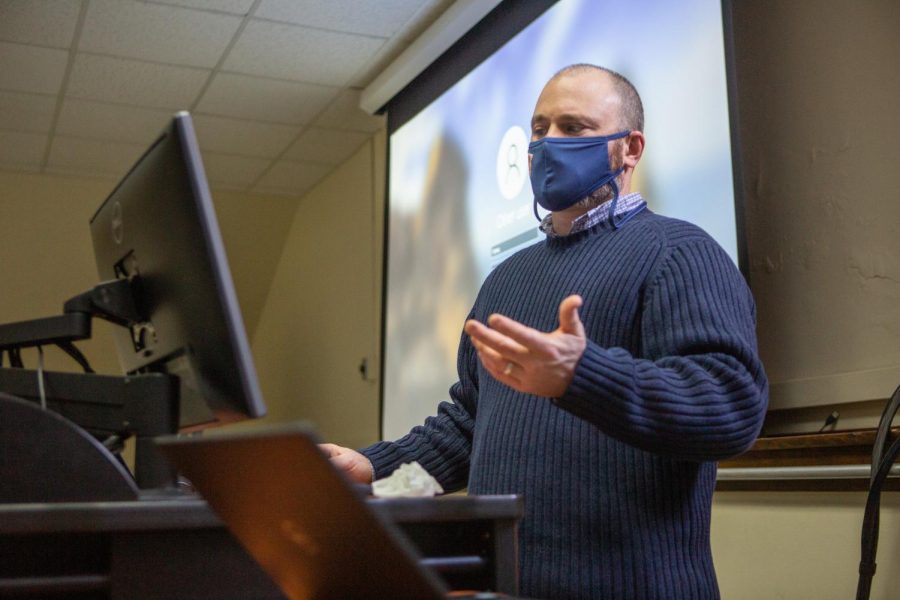Professor bridges leadership gap with Biden transition team
Professor Jonathan Coppess prepares to give a lecture on Friday afternoon. Coppess worked as a volunteer on the Department of Agriculture team for the Biden-Harris transition.
Feb 8, 2021
Jonathan Coppess’s third-grade son’s eyes darted across the TV as ivory polar bears trudged across the arctic tundra. He watched curiously and then turned to his dad and asked about why they are going extinct.
Unsure of what exactly to say, Coppess watched iceberg after iceberg collapse into the ocean on the screen.
“It was just a crushing conversation to say, ‘Maybe we’re trying, maybe we’re doing better,’” Coppess said, “but I do worry about the world they’ll grow up in and what it means for their winters to be different.”
As a former Senate employee, current University professor and recent volunteer for the Biden-Harris transition team, Jonathan Coppess has seen the real effects of policy play out before him. But now a father and teacher for young adults in college, he said his work hits closer to home.
“There’s so much more on the other end of these policies and the real-world implications that are so much more significant,” Coppess said.
Get The Daily Illini in your inbox!
Coppess volunteered for the Agency Review , the collection of teams transitioning departments from one president’s administration to the next, as a member of the Department of Agriculture team. He said the team ran into delays after the former president refused to concede. Without the letter of ascertainment confirming President Biden’s win in the 2020 election, the Agency Review was unable to start their work.
“Everybody on the ground knew the reality that this election was not truly contested and wasn’t really even close,” Coppess said. “So once we got the ascertainment, then that stuff filtered out as you put your head down and do the work.”
Coppess said the daily work of the team included reviewing budgets and transferring information to agencies within the federal government.
“There is this need to bridge the gap between the two leadership teams,” Coppess said. “You don’t want your new leadership to come in blind and be cold on the issues.”
After growing up on a family farm in Ohio, Coppess got his Bachelor’s degree in Business from Miami University and then went on to graduate from George Washington University Law School.
“Because agriculture is something I grew up with and it’s family, it’s the kind of thing you can throw yourself into,” he said.
From being named administrator of the Farm Service Agency by Tom Vilsack to researching farm bill policy at the University, Coppess’s career has often revolved around agriculture.
He said that although a lot of his work has been examining large policy decisions, his past reminds him that real people are affected by government decisions.
“It grounds that because you know the type of people that are on the other end of it,” he said.
But after working in Washington for eight years, he and his wife Susan Coppess decided to relocate to the University. Now the undergraduate coordinator for recruitment in ACES, she said public service is a priority as they try to raise their kids to be good citizens.
“When something like this that is an opportunity to serve and be an active citizen presents itself, we kind of both agree that those are things that we will try to make room for in our lives for if we can,” she said.
Now a professor in the College of ACES, Coppess teaches classes about agricultural law and policy while researching the history of farm bill policy.
Kristen Kurtz, senior in ACES, took classes with and was a teacher’s assistant for Coppess during her time at Illinois. After setting her sights on a future in politics, Kurtz said Coppess has a lot to offer his students.
“He has such a wealth of knowledge,” Kurtz said. “You’ll get so much more out of the class because he’s been there.”
Despite not working in Washington anymore, Coppess said the flexibility of still being involved in politics while he teaches at the University is something he values every day.
“I feel fortunate to have been able to have both seen how that transition process works from the inside and to know that the things we worked on mattered,” Coppess said. “It has been an incredible way to continue some level of involvement.”
Although he said he never would have imagined that he would be a professor someday, he said teaching young people and watching them form ideas is more rewarding than he ever would have thought.
And for him, the interactions he sees in the classroom inspire him to keep working towards a bigger goal.
“It gives me hope that you guys will figure it out and fix it all someday.”






